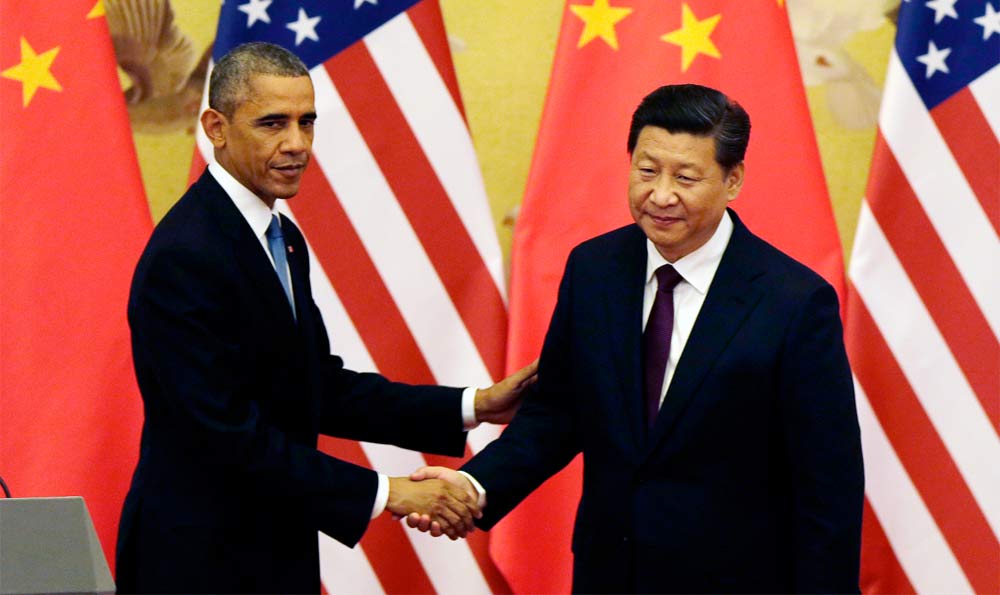This article written by ICT President Matteo Mecacci, co-authored by ICT Vice President Bhuchung K. Tsering, was published on September 22 by The Huffington Post.

U.S. President Barack Obama, left, shakes hand with Chinese President Xi Jinping after their press conference at the Great Hall of the People in Beijing, China in 2014. (Photo: AP)
It has been noted in Washington that President Xi’s self-proclaimed “China Dream” — a vision of a peaceful and rising China on the world stage — has become a Kafka-esque nightmare for many.
China’s government has been publicly blamed for major cyber attacks suffered by US federal institutions and businesses over the last months and more sanctions seem to be in preparation to target some of its officials. US and EU business leaders are now openly expressing concern for the safety of their work in China; fears that were previously reserved for political dissidents, Tibetan religious leaders, lawyers and journalists targeted by Beijing. CEOs and others are obviously concerned about the purge and targeting of city workers in China after the recent downturn of the financial markets.
There has been an unprecedented attack on Chinese civil society, resulting in the arrests of civil rights lawyers and peaceful activists. In Tibet, writers and artists have been tortured and imprisoned for singing about the Dalai Lama or expressing their views in literary journals.
The expansion of outposts in the South China Sea has unnerved China’s neighbors and US allies in the region and revived the debate about increasing US military spending to push back against what are perceived as Beijing expansionist aspirations in the Pacific.
The domestic anti-corruption campaign — with its international ramifications to recover financial assets — has not been followed up by a reform of the judicial system that provides independence. It is now perceived more as a way to eliminate other competing factions than a genuine attempt to implement the rule of law in the public sector.
We know that Tibet, as a strategic border area, is an important matter to China. The Party State has stepped up its rhetoric against the Tibetan leader, the Dalai Lama, in this context — which sits uncomfortably with the White House. President Obama has met the Dalai Lama four times and the two men enjoy a warm relationship.
The Dalai Lama’s peaceful advocacy and will to find a negotiated solution with China is highly respected in Washington, and his stature in the world stage as spiritual and moral leader increases with his age.
In the interest of China, and his own, Xi Jinping, certainly needs to give different signals to a world that is skeptical about his administration. A commitment to reduce carbon emissions in view of the COP21 UN Summit in Paris on climate change later this year is in the making, and would be certainly welcomed by the Obama administration, but it won’t be a surprise, as it won’t be enough expressing a general commitment to find “peaceful” solutions to the South China issues or to “fight against cyberterrorism.”
China can show to the world that it is really changing only if it can make profound reforms, such as moving from a centralized and authoritarian political system — which leads to its embrace of nationalistic and aggressive policies — to a more democratic and decentralized one, where the rule of law and a process of genuine consultations lead to sound political decisions.
For this, the Tibetan issue represents an important opportunity for Xi Jinping. By embracing the Dalai Lama’s sincere offer for dialogue based on his Middle Way Approach, and his decision to devolve his political authority to Tibetan institutions in exile — clearly indicating that he has no interest in going back to Tibet to rule — Xi Jinping would show that he is open to find some solutions to difficult and longstanding political issues that are of concern for the international community.
President Obama, who is also a Nobel Peace Laureate, should personally tell President Xi that he has nothing to fear from the Dalai Lama. The resistance by Tibetans to the decades-long policies of cultural and ethnic assimilation has been remarkably nonviolent so far, and this is largely due to the leadership provided by the Dalai Lama. It is the 80th birthday year of the Dalai Lama and this should provide a sense of urgency for resolving the issue in his lifetime. It is absurd to believe that Xi Jinping, leader of an atheist Party state, can ensure stability in Tibet through stage-managing a reincarnation of the Nobel Peace Laureate and seeking to eviscerate a peaceful religious culture.
Rather, by embracing the Dalai Lama President Xi might be able to bring about a change in the mindset of the international community on China and its future. China and its leaders know that despite its economic influence (which seem to be shaking currently) there is much distrust by the governments about China’s intentions and ambitions. If China respects the aspirations of the Tibetans for self-rule, the Dalai Lama could be a catalyst for China’s acceptance as a responsible member of the community of nations.
